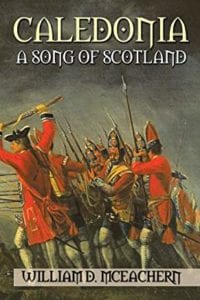
About the Book:
http://williammceachern.wordpress.com
By the author of the critically acclaimed novel, Casting Lots, William D. McEachern, Caledonia: A Song of Scotland is his second historical novel. Caledonia is the epic tale of Scotlands struggle to become an independent nation. In the process, the story of Scotland is revealed in its people, the Picts, the Irish Missionaries, the Norsemen, and the Highland Clans. All the natural beauty and wonder that is Scotland are captured for the readers enjoyment, from the wind-swept Isle of Skye through the Highlands with its towering bens, with numerous waterfalls, across the moors, purple with heather, and dotted with sheep and the lowing, ruddy Highland cattle, to the reflecting waters of the lochs, some mysterious and mist-laden, like Loch Ness, or picturesque, like Loch Lomond. Told from the viewpoint of one clan-the MacDonalds of Clanranald-the reader is swept along through the major events in the history of Scotland, from the writing of the Declaration of Arbroath in 1320, the Massacre at Glencoe by the Campbells, the MacDonalds greatest enemy, through the Rising of 1745 under Bonnie Prince Charles to the decisive defeat at The Battle of Culloden and the bloody Highland Clearances under William, the Duke of Cumberland. Caledonia acquaints the reader with why so deeply ingrained in Scotlands national psyche is its fight for freedom, both political and religious. Caledonia is the first novel in the series which will tell the story of the Scots not only in Scotland, but also in America.
Read an Excerpt:
Featured in April/May 2016 Issue: American Scences
The Battle of Prestonpans
Dawn was breaking. I ordered my men up. I waved my claymore in the air. Clanranald’s guttural, Gaelic battle cry rent the air, as the pipers’ bagpipes were skerling, drums were beaten, men fired their muskets…lochabar axes cutting the sky, dirks raised, and swords swinging. As they charged, our clan began its special pibroch…
The blades of swords struck one another, sparks flew, muskets fired…the acrid smell of burnt gun powder and smoke hung over obscuring the field. The caustic smoke caused my eyes to burn, while my tears flowed, distorting my vision. Sweat poured from every pore… the salty liquid creased the corners of my mouth …stung my eyes. My hands…spun, sliced, smashed, thrust, cut, hacked on and on again. My claymore was doing the work for which I had trained for years. The din crescendoed…
Parts of bodies were everywhere. A hand here. An arm there. A groan emanated from a body next to me. There was blood on my sleeve. A headless body was in front of me.
As our surge hit the English line, they broke and ran for the rear. The walls which they had thought would be their protection quickly proved to be their bottleneck and trap.
General Cope tried to stem the rout. He pulled his gun and yelled, “I will shoot the man who leaves his post! Stand with me men!”
Seeing General Cope standing against the flood, Colonel James Gardiner, the commander of the Dragoons, tried to rally the foot soldiers, his own horsemen having ingloriously fled the field. He was atop his white charger, when three Highlanders attacked him. One using a musket with bayonet…stabbed the horse causing it to rear, while another swung his sword missing the brave Colonel’s head. The third…raised his pistol…the Colonel…fell from his horse mortally wounded.
With this Cope’s army dissolved…clumps of men fleeing in all directions, throwing down their muskets, pistols, swords, and daggers. It was as if the starter of a race had yelled “Go!” In less than 15…minutes, an entire army had been wiped off the face of the earth.
